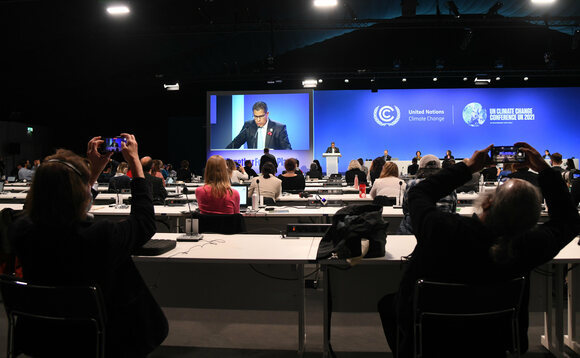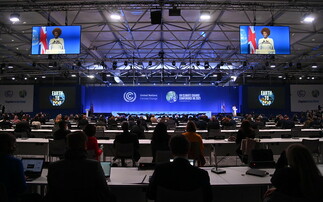COP26 President Alok Sharma addresses delegates on 9 November | Credit: COP26
Presidency hopes to deliver deal later today, but late dramas expected on plenary floor as divisions remain over key parts of the draft text
The COP26 Climate Summit entered its dramatic final stretch this morning, with observers predicting the negotiations will go to the wire later this afternoon as countries clash over key components of the draft text.
After the third consecutive day of round the clock negotiations, the COP26 Presidency this morning issued a raft of draft technical documents and the crucial draft cover text for the final agreement. However, the draft text sparked an angry response from green groups and some developing country delegations who criticised the failure to include proposals for a new Loss and Damage Finance Facility.
A stocktake plenary meeting is scheduled for midday, with the hosts optimistic it can be followed by a final plenary later this afternoon when a series of agreements can then be gavelled through and the Summit brought to a close.
However, technical negotiations are continuing in a number of areas and while there is confidence they can be finalised in the next few hours aspects of the draft cover text remain hugely contentious.
As such, observers are predicting this afternoon's plenary meetings could be characterised by angry interventions from delegations that are dissatisfied with the draft text and negotiating huddles to try and thrash out late compromise agreements.
Four potential flashpoints have been highlighted by observers, given the long-standing disagreements on how to strengthen national climate action plans, or Nationally Determined Contributions (NDCs) in the UN jargon; whether or not coal and fossil fuel subsidies should be included in the final text; new proposals for providing developing countries with funding for loss and damage and increasing flows of climate finance for adaptation measures; and how to enact new transparency mechanisms for ensuring countries deliver promised emissions reductions.
The draft text contains a crucial package of measures designed to increase pressure on countries to strengthen their NDCs next year so as to accelerate decarbonisation efforts before 2030 and move the world on a temperature trajectory that is compatible with the Paris Agreement.
Specifically, the text "requests Parties to revisit and strengthen the 2030 targets in their nationally determined contributions as necessary to align with the Paris Agreement temperature goal by the end of 2022, taking into account different national circumstances".
Some observers have questioned whether the call for countries to update their NDCs is robust enough, given it does not explicitly reference a 1.5C temperature goal and requests governments to update plans if it is deemed necessary.
But insiders insist the draft text applies significant pressure for countries to update their NDCs well ahead of the scheduled next update in 2025 and would allow the COP26 Presidency to claim the Summit has "kept alive" the hopes of keeping temperature increases below 1.5C.
Meanwhile, experts fear a major row could yet erupt over the references to "accelerating efforts towards the phase-out of unabated coal power and inefficient fossil fuel subsidies, recognising the need for support towards a just transition".
The wording on coal and fossil fuels has been qualified with the text now referencing the need for a "just transition" and only calling on countries to make "efforts towards" phasing out "unabated" coal power and "inefficient" fossil fuel subsidies.
But there is still widespread speculation that Saudi Arabia and a number of other major fossil fuel producers could yet call for all references to fossil fuels to be removed. However, the US and EU yesterday signalled their strong support for the references remaining in place and green groups have warned the text would be drastically weakened if they were to be removed.
Perhaps the biggest row is expected over Loss and Damage and climate finance, with some senior commentators already angry condemning the draft text.
The G77 group of developing economies had proposed a Loss and Damage Finance Facility, but the draft does not include the proposal and instead sets out plans for a "dialogue between parties, relevant organisations, and stakeholders to discuss the arrangements for the funding of activities to avert, minimise and address loss and damage".
There is a school of thought that the text represents a major step forward for loss and damage negotiations, which have historically been sidelined in the UN negotiations due to concerns amongst industrialised nations that formalising discussions of loss and damage could be interpreted as an avenue for making some countries accept liability for climate damages. Some insiders have noted how the new dialogue provides a formal framework for advancing discussions on loss and damage at a time when some initial, if modest, levels of funding have been promised for loss and damage.
But senior campaigners responded angrily to the proposals, with Saleemul Huq of the International Center for Climate Change and Development declaring that the new text on Saturday on Loss and Damage was worse than the previous text that appeared on Friday, and warning that COP26 would be "worse than" the 2009 Copenhagen Summit that ended in acrimonious failure.
Mohamed Adow of Power Shift Africa similarly condemned the proposed text, arguing that "vulnerable countries can't afford to leave with this current version of the text on loss and damage". "Whether Glasgow delivers a proper finance facility is how this summit will be judged by the world's most vulnerable countries," he added.
Meanwhile, BusinessGreen understands discussions on new transparency measures remain sensitive, with a number of emerging economies still thought to be uncomfortable with the current language.
In addition, China's Ministry of Ecology and Environment, Zhao Yingmin, gave an interview with Chinese state media overnight that further ramped up calls on industrialised nations to deliver an increase in climate finance. "Twelve years on, the developed countries have failed to honor their commitments, which has tremendously jeopardised political mutual trust," Zhao said, adding that it was "very unreasonable and unfair" that while developing countries have submitted NDCs in line with the Paris Agreement, developed countries have failed to deliver financial support.
"The developed countries have not yet shown their sincerity and confidence in delivering their pledges," he said. "Therefore, both sides are still negotiating. It seems that more efforts are still needed."
Negotiations on Article 6 on carbon markets are also thought to be rumbling on, despite the publication of a lengthy draft text overnight that suggested a compromise agreement could be in reach that would allow countries to transfer over some of their carbon credits from the regime established under the Kyoto Protocol, but would also see rules tightened to tackle the risk of emissions reductions being double counted.
The various potential flashpoints have been identified by insiders ahead of this afternoon's high stakes plenary sessions, which are expected to proceed while intense shuttle diplomacy continues in the background.
However, hopes remain relatively high that an agreement can be reached today with insiders insisting that an ambitious agreement remains within reach and that no country wants to be seen to block a deal that could establish the means for countries to strenghthen their NDCs well before 2025, deliver new frameworks for increasing flows of climate finance, and send a strong signal to governments and markets around the world that the transition to a net zero emission economy capable of "keeping 1.5C alive" is accelerating.










